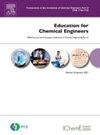Critique: YEASTsim - A Matlab-based simulator for teaching process control in fed-batch yeast fermentations
IF 2.3
2区 教育学
Q1 EDUCATION, SCIENTIFIC DISCIPLINES
引用次数: 0
Abstract
One of the primary challenges in chemical engineering education lies in the practical application of theoretical knowledge. Contemporary society demands chemical engineers who are not only adept at critical thinking but also proficient in practical problem-solving. Historically, acquiring such practical experience has been heavily dependent on laboratory experiments. However, with the advent of advanced technology, there are now more accessible and varied opportunities for experiential learning. Simulation-based learning tools have proven to be powerful complements to traditional laboratory experiments. These tools enable students to investigate complex chemical processes, test hypotheses, and develop practical skills in a safe, cost-effective, and scalable environment. This critique aims to evaluate the educational potential of the YEASTsim simulator, positioning it as an interactive and innovative tool to enhance the study of core subjects such as Chemical Reaction Engineering, a fundamental component of chemical engineering practice.
评论:YEASTsim - 基于 Matlab 的模拟器,用于喂料批次酵母发酵过程控制教学
化学工程教育的主要挑战之一在于理论知识的实际应用。当代社会要求化学工程 师不仅要善于批判性思维,还要精通解决实际问题的方法。从历史上看,获取这种实践经验在很大程度上依赖于实验室实验。然而,随着先进技术的出现,现在有了更多的机会进行体验式学习。事实证明,基于模拟的学习工具是对传统实验室实验的有力补充。这些工具使学生能够在安全、经济、可扩展的环境中研究复杂的化学过程、测试假设并培养实践技能。本评论旨在评估 YEASTsim 模拟器的教育潜力,将其定位为一种交互式创新工具,以加强化学反应工程(化学工程实践的基本组成部分)等核心科目的学习。
本文章由计算机程序翻译,如有差异,请以英文原文为准。
求助全文
约1分钟内获得全文
求助全文
来源期刊

Education for Chemical Engineers
Multiple-
CiteScore
8.80
自引率
17.90%
发文量
30
审稿时长
31 days
期刊介绍:
Education for Chemical Engineers was launched in 2006 with a remit to publisheducation research papers, resource reviews and teaching and learning notes. ECE is targeted at chemical engineering academics and educators, discussing the ongoingchanges and development in chemical engineering education. This international title publishes papers from around the world, creating a global network of chemical engineering academics. Papers demonstrating how educational research results can be applied to chemical engineering education are particularly welcome, as are the accounts of research work that brings new perspectives to established principles, highlighting unsolved problems or indicating direction for future research relevant to chemical engineering education. Core topic areas: -Assessment- Accreditation- Curriculum development and transformation- Design- Diversity- Distance education-- E-learning Entrepreneurship programs- Industry-academic linkages- Benchmarking- Lifelong learning- Multidisciplinary programs- Outreach from kindergarten to high school programs- Student recruitment and retention and transition programs- New technology- Problem-based learning- Social responsibility and professionalism- Teamwork- Web-based learning
 求助内容:
求助内容: 应助结果提醒方式:
应助结果提醒方式:


